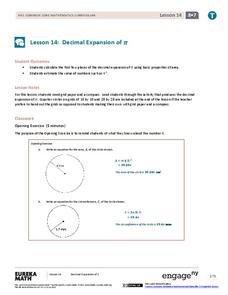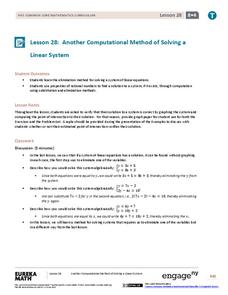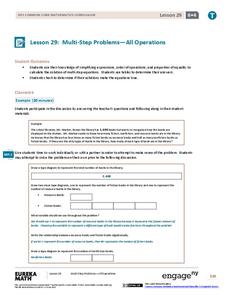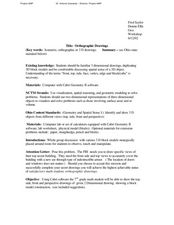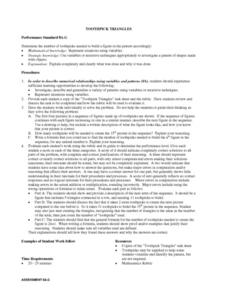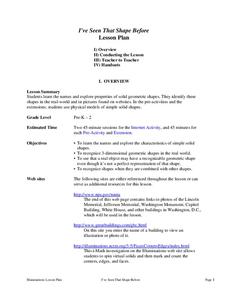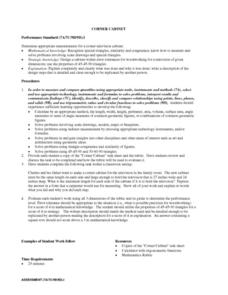EngageNY
Decimal Expansion of Pi
Develop a better understanding of the value of pi. Learners explore the area of a circle using estimation and graph paper. While continuing to estimate the area of the circle using smaller and smaller grids, the number pi emerges.
Curated OER
Polynomials and Factoring
Students classify, add, subtract, and factor polynomials. In this polynomials activity, students classify polynomials by creating their own system. During a discussion, the class decides on a common system. They add and subtract...
EngageNY
Sequencing Translations
Investigate the results of multiple translations on an image. Scholars use vectors to perform a sequence of translations in the seventh lesson of 18. They examine the results and determine the importance of using a sequence rather than a...
EngageNY
Comparing Linear Functions and Graphs
How can you compare linear functions? The seventh installment of a 12-part module teaches learners how to compare linear functions whose representations are given in different ways. They use real-world functions and interpret features in...
EngageNY
Linear and Nonlinear Expressions in x
Linear or not linear — that is the question. The lesson plan has class members translate descriptions into algebraic expressions. They take the written expressions and determine whether they are linear or nonlinear based upon the...
EngageNY
Informal Proof of AA Criterion for Similarity
What does it take to show two triangles are similar? The 11th segment in a series of 16 introduces the AA Criterion for Similarity. A discussion provides an informal proof of the theorem. Exercises and problems require scholars to apply...
EngageNY
Exponential Notation
Exponentially increase your pupils' understanding of exponents with an activity that asks them to explore the meaning of exponential notation. Scholars learn how to use exponential notation and understand its necessity. They use negative...
EngageNY
Another Computational Model of Solving a Linear System
The process of elimination really works! Use elimination when substitution isn't doing the job. The 29th segment in a series of 33 introduces the elimination method to solving linear systems. Pupils work several exercises to grasp the...
EngageNY
Multi-Step Problems—All Operations
Harness the power of algebra to solve problems. Young mathematicians learn to work out multi-step problems by applying algebraic techniques, such as solving equations and proportions. They use tape diagrams to model the problem to finish...
Curated OER
Orthographic Drawing
Students investigate orthographic drawings. In this geometry lesson plan, students identify properties of three dimensional drawings in space. They solve problems using volume and area formulas.
Curated OER
Growing Circles
Students identify the equation to represent a circle. In this algebra lesson, students review properties of conics and how they are related. they use a robot to create a visual of circles and their application to the real world.
Curated OER
Amazing Consistent Ratios
Learners derive the six trigonometric identities. In this trigonometry instructional activity, students find the ratios of sine, cosine and tangent using the right triangle. They use properties of the Pythagorean Theorem to find the trig...
Curated OER
Integers
Students perform order of operation using integers. For this algebra lesson, students apply properties of integers as they add, subtract, multiply and divide integers. They work in groups to complete a RAFT assignment.
Curated OER
Toothpick Triangles
Students draw a chart (included in the lesson) to use with their investigation. They review terminology of triangles and receive toothpicks to use in the lesson. Beginning with three toothpicks, students form a triangle. They complete...
Fayetteville Public Schools
I've Seen That Shape Before
The objectives in the resource allow learners to explore the characteristics of simple solid shapes. Youngsters learn to recognize the face shapes, corners, and edges that make up 3-D figures by filling in a chart. Lastly,...
Curated OER
Pedal Triangles
Students identify the properties and theorems of triangles. In this geometry activity, students construct angle bisectors using a compass and straight edge. They identify triangular similarity and congruency.
Curated OER
Pythagorean Theorem: Triangles and Their Sides
Students investigate triangles and their relationship to each other. In this geometry lesson, students solve right triangles using the properties of the Pythagorean Theorem. They differentiate between right, acute, straight and oblique...
Curated OER
Quadratic Rules and Graphs
Students identify the properties of quadratic equations. For this algebra lesson, students find the vertex and intercepts of a parabola. They factor quadratics and identify the zeros of the equations.
Curated OER
How Much Data is That?
Students differentiate between exponential and logarithmic functions. In this algebra lesson, students use logarithmic properties to solve equations. They identify growth and decay of graphs.
Curated OER
Faster speed-Shorter Time
Students calculate the inverse variation, and speed given the formulas. In this algebra lesson, students investigate properties of conics, focusing on the hyperbola. They identify the distance between the directrix and other parts...
Curated OER
Inquiry Unit: Modeling Maximums and Minimums
Young mathematicians explore the maximun area for patio with the added complexity of finding the mimimum cost for construction. First, they maximize the area of a yard given a limited amount of fence and plot width v. area on a...
Kentucky Department of Education
Multiplication Grade 3 Formative Assessment Lesson
Guide multiplication lesson plan instruction with a formative assessment. Mathematicians are given two multiplication problems to solve and represent using the area model, equal groups, repeated addition, and word problems. Following the...
Curated OER
Problem Solvers
Fifth and sixth graders compare decimals to the place-value structure in the base-ten number system. They represent fractions as parts of unit wholes, as parts of a set, as locations on a number line, and as divisions of whole numbers....
Curated OER
CORNER CABINET
Ninth and tenth graders calculate the length, width, height, perimeter, area, volume, surface area, angle measures or sums of angle measures of common geometric figures. They solve problems involving scale drawings, models, maps or...
Other popular searches
- Math Properties of Addition
- Powerpoint Math Properties
- Properties of Math
- Addition Properties in Math
- Mental Math Properties
- Math Properties Games
- Pictures of Math Properties
- Properties in Math
- Elementary Math Properties
- Math Properties Projects
- 8th Grade Math Properties
- Math Properties Lesson Plans


